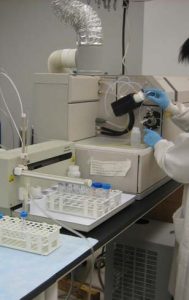 See What Normal Blood & Urine Values Are
See What Normal Blood & Urine Values Are
 Causes Of Most Abnormal Blood & Urine Tests
Causes Of Most Abnormal Blood & Urine Tests
The cobalamin Level In Your Pet’s Blood
cobalamin = Vitamin B-12
This test is usually performed by your veterinarian when he/she suspects a pancreatic problem in your dog or cat (Exocrine Pancreatic Insufficiency or EPI) or an intestinal nutrient malabsorption problem, such as often occurs in inflammatory bowel disease when it affects dogs or cats. Read about that problem in your dog here and your cat here. Generally, a serum folate and a trypsin-like immunoreactivity test (TLI) are performed at the same time. Problems in that area of the intestine can prevent cobalamin absorption and cause your dog or cat’s blood cobalamin levels to be low.
The best source of B-12 for your dog or cat is fresh calf’s liver that has been lightly cooked. The vitamin B-12 content of liver stands up to roasting and grilling well but not to frying. It retains its B-12 content well when frozen but not when repeatedly frozen and thawed. Liver is also an excellent source of folate for your dog and cat.
Absorption through the wall of the small intestine is a complex process and the vitamin’s level in your dog or cat’s blood stream can be low when areas of your pet’s small intestine are inflamed, thickened or hypermotile.
The same problem can occur when certain bacteria that normally inhabit that portion of your pet’s intestine have increased or decreased in number (antibiotic-responsive enteropathies aka small intestinal bacterial overgrowth = SIBO)
Reasons Your Dog Or Cat’s Blood cobalamin Level Might Be Low:
Inflammatory bowel disease (IBD), particularly when the lowest portion of the small intestine (the ileum) is involved.
Intestinal bacterial overgrowth or SIBO aka antibiotic responsive diarrheas. These antibiotic-responsive diarrheas are most commonly seen in young dogs of larger breeds.
Inflammatory bowel disease (IBD), triad disease/cholangiohepatitis and intestinal lymphosarcoma/lymphoma in cats.
Genetic defects in cobalamin absorption in dogs (hereditary selective cobalamin malabsorption in giant schnauzers, border collies, Australian shepherds and beagles).
A blood cobalamin deficiency (particularly in cats) can cause the the pet to refuse to eat. Cats that won’t eat, inevitably get worse – no mater what their underlying health issue is. It is common for them to develop hepatic lipidosis. So, those feline patients need their cobalamin levels supplemented with B-12 injections.
Chronic inflammation of your pet’s pancreas (pancreatitis) or repeated bouts of acute pancreatitis that result in scarring can decrease the amount of digestive enzymes your pet’s pancreas produces. That is called exocrine pancreatic insufficiency (EPI). Your pet’s pancreas has two portions, the endocrine portion produces insulin to control blood sugar levels and the exocrine portion produces digestive enzymes. If the insulin-producing portion is significantly harmed, your pet will become diabetic. Read about diabetes in cats here and dogs here. It is not that unusual for both EPI and diabetes to occur in the same pet.
There are various other chronic inflammatory diseases of the intestine and even intestinal birth defects that can result in poor absorption of nutrients – including vitamin B-12. Veterinarians call these maldigestion/malabsorption problems. All are poorly understood and all can result in low blood cobalamin levels. But they do not do so in every case.
As I mentioned earlier, inflammatory bowel disease (IBD in dogs, IBD in cats) or lymphoma/lymphosarcoma in cats are common causes for low cobalamin levels.
DxMe
You are on the Vetspace animal health website
Visiting the products that you see displayed on this website help pay the cost of keeping these articles on the Internet.


